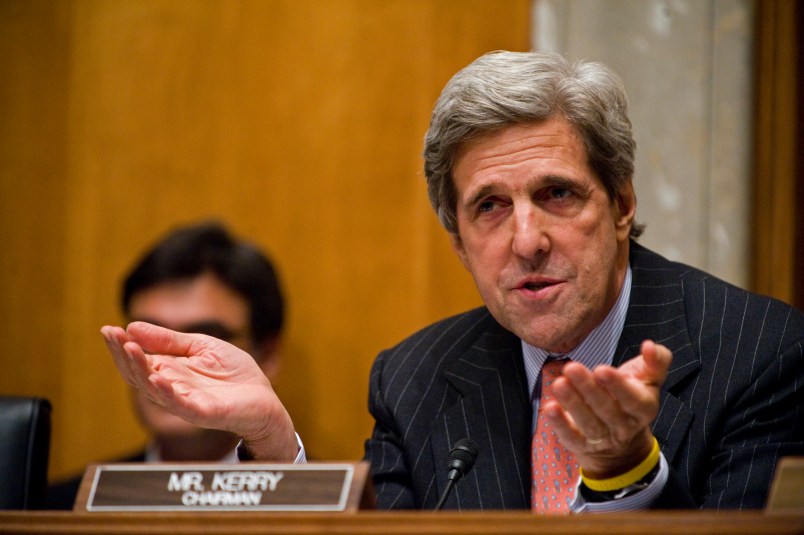Sen. John Kerry (D-MA), fresh from a trip to Pakistan aimed at repairing deeply frayed relations with the United States, said Tuesday the two nations are at a critical crossroads and cautioned against either side taking precipitous action.
Kerry spent the weekend meeting with Pakistani officials and trying to determine steps that would assuage the deep distrust between the two nations after the discovery of Osama bin Laden inside Pakistan and his subsequent killing in a covert operation by a Navy SEALs team.
Outraged that elements of Pakistan’s government or military may have helped harbor bin Laden on an estate near a military training academy, many in Congress have threatened to cut off billions of dollars in U.S. military and humanitarian assistance.
Some Pakistani officials were equally infuriated that the U.S. violated their sovereignty by flying helicopters into the country and raiding bin Laden’s compound without their permission. The Pakistani Parliament voted to consider shutting down the supply lines the U.S. military uses to move goods and equipment into Afghanistan, if the unilateral drone attacks and assaults continue.
After returning early Tuesday morning, Kerry, who chairs the Senate Foreign Relations Committee, at a hearing urged extreme caution and said he is hopeful cooler heads will prevail.
“Everybody has a sense of how critical this moment is for our strategic interest in the region…as much as some people have reached a level of impatience or serious evaluation of where we are and where we’re going,” he said, “it’s very clear to me that we need to be careful and thoughtful so not to lose the progress that’s been made.”
Even as hearings were underway, reports were emerging that Pakistani forces had fired on two NATO helicopters they accused of having violated Pakistan’s airspace along the border with Afghanistan
While in Pakistan, Kerry said he had the most specific and detailed discussions to date about the two countries’ complicated relationship and partnership in fighting terrorist elements. Kerry said he worked on language of a joint statement between the U.S. and Pakistan, pledging cooperation on “high-value” terrorism targets.
Details of the promised cooperation are still being forged by administration officials in advance of an expected trip by Secretary of State Hillary Clinton to Pakistan, Kerry said.
“The proof is in the pudding,” Kerry said at the hearing. “This is no longer a time when joint statements are issued and everyone goes about its way.”
Gen. James Jones, who formerly served as President Obama’s national security adviser, said it’s time for Pakistan to stop “playing both sides against the middle” and reacting to events on a day-to-day basis and start thinking about its long-term future and what kind of country it wants to be in 10 to 15 years.
In order to continue receiving the same amount of U.S. aid — nearly $4 billion so far by some estimates — Pakistan needs to demonstrate in tangible terms a willingness to pursue all terrorists who are using the country as a safe haven, Jones said. If that is done, U.S. aid would not be disrupted.
“To me, it’s no more complicated than that, but they’ll make it more complicated,” he said.
Later, in response to questioning by Sen. Marco Rubio (R-FL), Jones acknowledged Pakistan’s deep concerns about the U.S. leaving Afghanistan before the country is stable enough to prevent the Taliban’s return to power, referring to the power vacuum left in early 1990s after the U.S.-backed Afghanistan pushed the Soviet Union out of the country but failed to rebuild it.
“[Pakistani officials] will cite history as the example,” Jones testified. “They are fearful of the fact that we will once again leave…and they will have the Afghan problem and the Taliban problem in their own country to deal with. For whatever reason, we have not made the case to them that we are long-term strategic partners…”
Kerry stressed that the relationship is far more complicated than it would appear on the surface for many U.S. observers caught off guard by the discovery of bin Laden hiding out in a town full of retired Pakistani military.
Fifty-percent of U.S. military supplies for Afghanistan run through Pakistani routes, Kerry said. In addition, the Pakistani military has suffered 5,000 casualties in fighting terrorists in their country since the 9/11 attacks, and have allowed the U.S. access to track down al Qaeda within their borders despite taking serious political heat for doing so.
Kerry concluded the hearing by reminding senators that fighting al Qaeda, the Taliban and securing a stable Afghanistan will be far more expensive for the U.S. without Pakistani cooperation.









